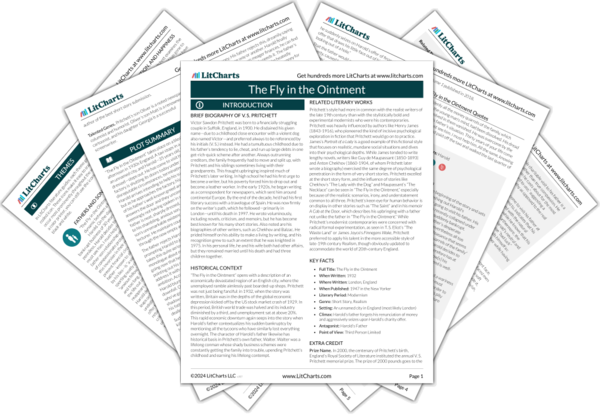“The Fly in the Ointment” considers how a moment of crisis can amplify self-delusion. Harold himself must have performed a bit of self-deception in order to visit his newly bankrupt father in the first place, letting his sympathy override all that he knew about his nefarious father. This effort to look beyond his misgivings about his father runs aground, however, when this moment of crisis enables Harold to notice “for the first time” his father’s literal two-facedness. As he speaks with his father, he realizes that the older man has two distinct modes of presenting himself—modes that are embodied by two facial expressions that his father alternates between depending on his mood. This double-faced quality itself symbolizes the father’s ability to hide his fearful and greedy “inner face” within the grandstanding outer one, and this speaks to his capacity to delude even himself regarding the greediness at his core. The father first says, “what we all want is ideas—big ideas.” Just a few minutes later, he states, “We deceive ourselves. We don’t want [money],” claiming that he only wants to escape to some seaside cottage. As if this weren’t enough of an about-face, he reveals this new stance to be yet another self-deception when he suddenly seizes on Harold’s offer of financial assistance—an offer that draws his little face out of his big one “like a fox looking out of a hole.”
That the father would grandiosely compare his newfound poverty, caused by his own business malpractice, to the Israelites’ exodus casts him as a master of self-delusion, suggesting that he has found a way to frame his hardship as a form of external persecution instead of the self-inflicted predicament that it is. For his part, Harold wants to maintain the polite fiction surrounding his father’s shady career, horrified when the father seems about to puncture it: “Don’t start telling the truth,” he silently pleads. By outlining both Harold and his father’s willful deceptions (of both each other and of themselves) in a moment of interpersonal calamity, then, the story suggests that delusion is a seemingly unavoidable feature of life, especially in difficult or extenuating circumstances.
Self-Delusion ThemeTracker

Self-Delusion Quotes in The Fly in the Ointment
Suddenly all the money quarrels of the family, which nagged in the young man’s mind, had been dissolved. His dread of being involved in them vanished. He was overcome by the sadness of his father’s situation. Thirty years of your life come to an end. I must see him. I must help him. All the same, knowing his father, he had paid off the taxi and walked the last quarter of a mile.
“I’m all right,” the son said, smiling to hide his irritation. “I’m not worried about anything. I’m just worried about you. This—” he nodded with embarrassment to the dismantled showroom, the office from which even the calendars and wastepaper-basket had gone—“this—” what was the most tactful and sympathetic word to use?—“this is bad luck,” he said. “Bad luck?” said the old man sternly.
A different man was speaking, and even a different face; the son noticed for the first time that like all big-faced men his father had two faces. There was the outer face like a soft warm and careless daub of innocent sealing wax and inside it, as if thumbed there by a seal, was a much smaller one, babyish, shrewd, scared and hard.
“[…]what you want, what we all want, I say this for myself as well as you, what we all want is ideas—big ideas. We go worrying along but you just want bigger and better ideas. You ought to think big. Take your case. You’re a lecturer. I wouldn’t be satisfied with lecturing to a small batch of people in a university town. I’d lecture the world. You know, you’re always doing yourself injustice. We all do. Think big.”
“Yes, can’t you hear it? It’s peculiar how you can hear everything now the machines have stopped. It took me quite a time to get used to the silence. Can you see it, old chap? I can’t stand flies, you never know where they’ve been.”
“You know where I went wrong? You know where I made my mistake?” The son’s heart started to a panic of embarrassment. For heaven’s sake, he wanted to shout, don’t! Don’t stir up the whole business. Don’t humiliate yourself before me. Don’t start telling the truth. Don’t oblige me to say we know all about it, that we have known for years the mess you’ve been in, that we’ve seen through the plausible stories you’ve spread, that we’ve known the people you’ve swindled.
“Don’t say I want money,” the old man said vehemently. “Don’t say it. When I walk out of this place tonight I’m going to walk into freedom. I am not going to think of money. You never know where it will come from. You may see something. You may meet a man. You never know. Did the children of Israel worry about money? No, they just went out and collected the manna. That’s what I want to do.”
He coloured. He hated to admit his own poverty, he hated to offer charity to his father. He hated to sit there knowing the things he knew about him. He was ashamed to think how he, how they all dreaded having the gregarious, optimistic, extravagant, uncontrollable, disingenuous old man on their hands. The son hated to feel he was being in some peculiar way which he could not understand mean, cowardly and dishonest.











